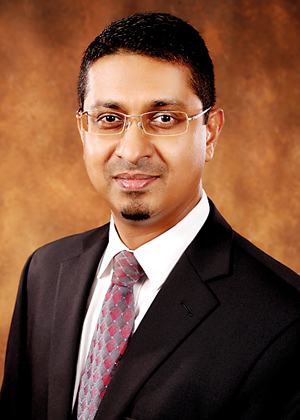Data is the ‘New Oil’

Mr. Riza Wadood
Oil has traditionally been considered as one of the most precious physical assets for the last few centuries but the advent of the computer and subsequent evolution of Internet to deploy information has seen ‘data’ replacing this commodity as the ‘new oil.’
Over the past decade ‘data’ has evolved into an essential resource that powers the information economy in much the same way that oil has fuelled the industrial economy. Agrees Riza Wadood – Country General Manager, IBM Sri Lanka, noting that the future is bright. “What Internet did to information, artificial intelligence (AI) will do to data,” he told the Business Times in an interview this week.
Contrary to popular conviction, he added that the rise of AI will make most people better off over the next decade. “It’s easy to see which way it will turn out to be the way data is used to power much of the transformative technology we see today such as in AI, automation and advanced predictive analytics. To get a perspective, for those familiar with Marvel hero movies, Tony Stark the title character in Iron Man activates an AI named FRIDAY for the final battle in Slovakia against Ultron. FRIDAY was a replacement for JARVIS (an acronym for Just A Rather Very Intelligent System) who was Tony’s digital companion. JARVIS was perfect for helping to accomplish everyday tasks such as picking out his tuxedo, warming up Tony’s Lambourghini and defeating alien threats. So what JARVIS was to Tony, Apple’s Siri and Amazon’s Alexa is to us, still in a smaller way. Code-driven systems have multiplied to more than half of the world’s population in ambient information and connectivity, offering previously unimagined prospects. As emerging algorithm-driven AI continues to increase, AI will be integrated into most parts of life, generating new efficiencies and boosting human capacities.
AI’s role in adding to wide public-health programmes built around large amounts of data that may be captured in the coming years about everything from personal genomes to nutrition, changes in formal and informal education systems, human resources management is the future, according to Mr. Wadood. It’s already used in banking, logistics, air transportation, security and healthcare. “At IBM we use a lot of AI around HR to manage attrition, etc,” he added. So much so that IBM has saved US$ 300 million globally through AI.
Mr. Wadood noted that the issue most have with AI is that they are still unable to trust it. That is where IBM is leading the way in building trusted AI for business. “For more than a century, we have been creating solutions that build collaboration and trust between people, businesses, and machines,” Mr. Wadood said.
As an organisation it’s important to adopt AI in a way to augment the humans. “It’s important to note that when combining the two the value is immense,” Mr. Wadood said noting that it is important to re-skill the people about how to be able to adopt these technologies. Now with cloud technology, a small organisation can do what a big one can. So AI is not limited. Your imagination is your limitation, Mr. Wadood added.
He said that many organisations here are very keen on using AI. “Already chat box and AI for weather prediction is being used. Also some organisations are experimenting with AI,” he said noting that some banks, telecommunication companies and insurance companies are going ahead with AI systems.
He added that most businesses look at the return on investment. “They generally look as if the return is fast enough. This will happen if the companies change their way of doing business.”
AI is not just a one-dimensional technology. Its benefits are far more significant than its concerns; Mr. Wadood added noting that this is exactly what will help humans in the future. While AI will totally alter how work gets done and who does it, the technology’s bigger effect will be in matching and expanding human capabilities, not swapping them, he explained.


